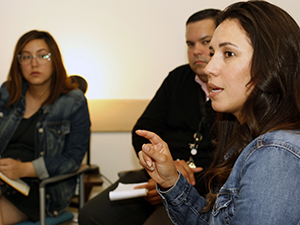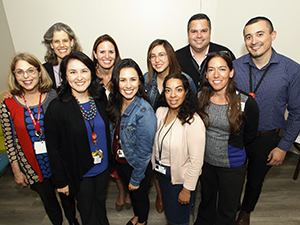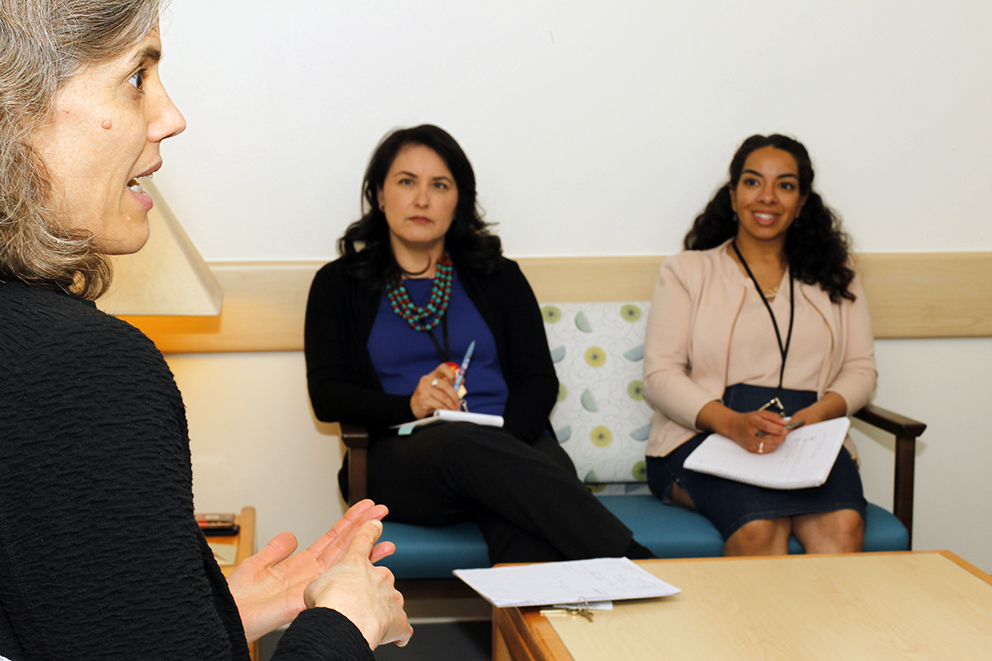A mental health program called La Clínica at the Kaiser Permanente Richmond Medical Center is providing care for the Hispanic community, which has its own set of values and traditions. Pictured, La Clínica founder Jessica Dominguez, center, and Ixayan Baez, a Psychiatry Department fellow, at right.
A Kaiser Permanente mental health program in Richmond, California, for Hispanic members is setting the standard for care by offering culturally sensitive therapy in its patients’ preferred language.
With about 918,000 Hispanic, or Latinx, members in Northern California, the need for mental health services in step with their culture is huge, said Jessica Dominguez, LMFT, a therapist in the Richmond Medical Center Psychiatry Department who was instrumental in starting La Clínica (The Clinic) as a pilot in 2015.
“This is about providing care in the language you prefer, being attuned to cultural nuances, values and norms, and just really making an effort to meet the patients where they are,” said Dominguez, who grew up in a traditional Mexican family in Stockton, California. “I am Latina, and I never had this kind of care when I was seeking mental health care for myself.”
Adding Bilingual Therapists
Since starting La Clínica, the number of bilingual mental health therapists in Richmond has grown from six to 15, and it has added two bilingual psychiatrists.

During the pilot in 2015, the percentage of patients who showed up to their first appointment grew from 75% to 90%, a direct result of the culture-specific care offered through the program, Dominguez said. La Clínica also grew the number of group therapy sessions in Spanish from one to three each week.
Providing culturally responsive care to the Latinx, communities, Dominguez said, means understanding the stigma of mental illness for that particular group, how mental health issues are different for the population and how Latinx members go about getting treated.
“The biggest stigma is that if you are going to talk to a mental health therapist, that means you’re ‘crazy,’” she said. “And you might not go outside of the family system, which means there can be generations of mental health issues that don’t get support.”
Recognizing Differences
Latinx members tend to be more vulnerable to stresses associated with immigration, acculturation and physical trauma, Dominguez said. They also often try home remedies handed down from grandparents, like tea, or consult religious leaders first, and then if the issue develops a physical component like chronic headaches, they will visit their primary care doctor.

That is why La Clínica developed a “warm handoff” protocol from primary care physicians in the Spanish speaking La Salud (The Health) clinics to get patients help right away, usually during the same appointment.
In addition to partnering with La Salud, the program tapped interpreter services for times when there is not a bilingual therapist available. It also collaborates with the Health Education Department to provide bilingual materials around depression, stress and substance abuse.
The final component is a group consultation each week where therapists share information about their cases and the community based agencies that provide resources to patients and their families. The consultation also helps prevent burnout, Dominguez said.
The Richmond program is growing increasingly popular by word of mouth, one of the best indicators of its success, she added.
“When someone gets good treatment, they will tell their community,” Dominguez said. “They trust recommendations from family and community. It’s ‘if you build it, they will come.’”





This Post Has 11 Comments
This is fantastic! Having personal stories as it relates to mental health and the need to be able to identify with those you seek to find help from, I feel this also a HUGE need in the “Black/Negro/African American/Indigenous People’s” community in all service areas. As we, too, have a very specific set of culturally centered triggers stemming from systematic trauma that vastly affects our group(s) specifically in ways that it affects no other culture in America and across the globe. Having culturally attuned treatment options with/from professionals that not only look like me, but share similar historic and cultural nuances would be a HUGE benefit to the community at large.
Great piece. The road to mental health and stability is not an easy one, but to be able to feel those you seek help from may better understand you as a person, I believe speaks volumes in ways that cannot fully be articulated… For some of us, some of those traumas of yesterday are very real and present today on a daily basis, if not for ourselves, for our loved ones.
This is really great! Three cheers for cultural competence at KP!
As a Chicano I feel great knowing that this may roll out in different areas based on the success of this pilot program!!! Yay, Kaiser.
It makes me so happy to hear the wonderful, positive changes being created and taking place for our Latino community in Psychiatry.
As always, Interpreter Services is happy to help!
Thank you for providing such culturally sensitive care for la raza!
Hoping this can come to Napa in the near future. We have a large Latinx population. Thank you for all you do!
Thanks for everything you do!
I appreciate the intended use of ‘Latinx’ when discussing Hispanic people, but most Latinos do not refer to themselves as such. Spanish happens to be a gendered language and most people of Hispanic origin are comfortable with this. I can’t imagine that being called Latinx helps gender conforming Latinos feel more included/accepted as members of our general community.
Thank you for your feedback. It is the preference of La Clínica to use the gender neutral term, Latinx.
I myself do not identify as Latinx, so for the “La Clinica” or to assume as whole we agree with this label. In addition we are not all American Spanish-
Sincerely with respect,
I agree.